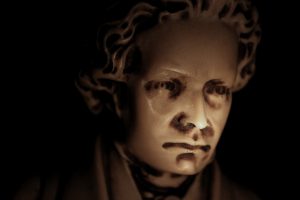みなさん、こんにちは。
今回はベートーベンの生涯について英語を交えて読んでみましょう。
ベートーベンと父親
ルートヴィヒ・ヴァン・ベートーベンは、1770年にドイツのボンで宮廷音楽家の息子として生まれました。幼い頃からピアノの才能を発揮し、8歳で最初の公演を行っています。ベートーベンの父親は、彼を次の神童、モーツァルトと並ぶ天才として出世させたいと考えていました(これが後にベートーベンの神童に対する嫌悪感につながったことは間違いありません)。そして、ベートーベンは1787年からボンの宮廷音楽家として雇われ、この間、ハイドンとモーツァルトの下で学びました。これはベートーベンにとって満足のいく関係ではありませんでしたが、彼の作曲に大きな影響を与えことがわかっています。(または影響を与えたように見える)このように、ベートーベンの作品には多くのエピソードがあります。そして、後で紹介するように、ベートーベンの人生は、初期、中期、後期と呼ばれる3つの時期に分かれています。
Ludwig Van Beethoveen was born in 1770 in Bonn, Germany as the son of a court musician. His talent for the piano was soon realized and he gave his first public performance at the age of eight. Beethoven’s father wanted to promote him as the next child prodigy, another Mozart. (This most surely led to Beethoven’s absolute distaste for child prodigies later in his life.) Nevertheless, Beethoven was employeed as a court musician in Bonn from 1787. During this time he studied briefly under both Haydn and Mozart, although it was certainly not a satisfying relationship for Beethoven. It turns out that events in Beethoven’s life greatly affected (or seem to have affected) him writing. Because of this Beethoven’s musical output is very episodic. As we shall see, there are three main periods in Beethoven’s life, known simply as the early, middle, and late periods.

貴族階級に愛された音楽と聴力の低下
1792年、ベートーベンはウィーンに移りました。これは、1800年ごろまで続いた初期の始まりになります。この間、ベートーベンはピアニストとして名を馳せ、彼のピアノの腕前は貴族階級に愛されました。実際、彼はわざと名前のヴァン(無意味な称号)をフォン(貴族の称号)に変えて、自分のルーツが貴族であることを主張しようとさえしました。この時期の作品は、主に彼の得意な楽器であるピアノで構成されていました。この時期に作曲された作品では、ピアノソナタ第8番「悲愴」が有名です。ベートーベンの聴力はこの時点で悪化し始めていましたが、彼はこの事実を周囲の人々から隠すために多大な努力を払っていました。ベートーベンが聞くために使用した装置の写真を下に示します。
ベートーベンは、西洋音楽の歴史における過渡期の人物であると言えます。一般的にはロマン派音楽の父として知られていますが、初期の作品のほとんどは本質的に古典派音楽(ハイドンとモーツァルトに代表される)でした。
In 1792, Beethoven relocated to Vienna. This is the beginning of his early period which lasted rougly until 1800. During this time Beethoven quickly made a name for himself as a virtuoso pianist. He used his abilities at the piano to gain favor with the nobility. In fact, he even tried to claim his own noble roots by accidentially changing the Van (a meaningless title) to Von (a title of nobility). His compositions during this period consisted mainly of works for his main instrament, the piano. An example of a piece composed during this time is the Pathétique Sonata, Op. 13 (1798). Beethoven’s hearing was also beginning to deteriotate at this point, however, he went to great lengths to hide this fact from those around him. A picture of the apparatus used by Beethoven to hear is pictured below.
Beethoven is a transistion figure in the history of western music. He is generally known as the father of the Romantic era. However, during the first period most of his compositions were classical (ie Hadyn and Mozart) in nature.

不滅の恋人
しかし、1809年、おそらく健康と精神状態の低下に関連して、彼の作曲活動は低調になっていきました。1815年頃には、有名な「不滅の恋人」事件が起こり、ベートーベンは重い鬱病に陥り、自殺をも考えました。この「不滅の恋人」の正体については多くの議論がありましたが、その幸運な女性はブランズウィック伯爵家出身のヨゼフィーネ・デイム伯爵夫人であると想定されています。
However, in 1800 Beethoven is reported to have turned his friend Krumpholz and said, “I am not very well satisfied with the work I have thus far done. From this day on I shall take a new way.” And basically, he did. Beethoven abandoned the classical forms of the previous century and set out for a more expressive (Romantic) musical voice. His musical imagination began to grow beyond that of the piano. This period, which later became known as the Heroic Period because of the larger than life nature that his compositions took on, saw the creations of such masterpieces as the Tempest Sonata, Op. 31 (1801-2), the 3rd Symphony (Eroica), Op. 55 (1803), his only opera, Fidelio, Op. 72 (1803-5), and the 5th Piano Concerto (Emperor), Op. 73 (1809). Some say that this middle period was Beethoven’s greatest. It certainly was his most productive. In about a decade Beethoven produced countless masterpieces in every genre.

現状に満足せず、新しい道を切り開く
若いころから名声を得ていたベートーベンですが、1800年に友人のクランプホルツに向かって「今までの仕事には満足していない。今日からは新しい道を歩む」と言ったとされています。そして、彼はその言葉通りにしました。ベートーベンは前世紀のクラシック形式を捨て、より表現力豊かな(ロマンティックな)音楽に着手したのです。彼の音楽的想像力はピアノのそれを超えて成長し始めました。この時代は、曲の壮大さによって後に英雄時代として知られるように、ピアノソナタ第17番ニ短調「テンペスト」、 交響曲第3番(エロイカ)、唯一のオペラ、「フィデリオ」、ピアノ協奏曲第5番(皇帝)などの傑作が作られました。この中期こそがベートーベンが最も偉大な時期であったと言う人もいます。確かにこの時期のベートーベンは多くの曲を書いています。約10年にわたって、多くのジャンルで傑作を無数に生み出したと言えます。
In 1809, however, his musical output began to drop, possibly in connection to his declining health and mental state. Around 1815 the famous Immortal Beloved affair occured which left Beethoven in deep depression and contemplating suicide. Although there has been much debate over the identity of this Immortal Beloved character, it is now assumed that the lucky woman was Josephine, Countess Deym, née Countess von Brunswick whose picture is shown below.

甥との関係
その後、1818年までベートーベンはほとんど作曲しませんでした。この時点で、彼は完全に聴力を失い、精神的にも不調をきたしていました。また弟も自身の母親を後見人として息子のカールを残し亡くなりました。ベートーベンは唯一の甥であるカールを育てるのに母親はふさわしくないと感じたため、子供の養育権をめぐって訴訟を起こし、貴族の影響力を利用して勝訴しました。しかし、残念なことにベートーベンは父親に向いているとは言えず、カールとの関係は非常に浅かったため、数年後にはカールは自殺未遂にまで追い込まれました。ベートーベンはカールを心から愛しており、カールに音楽を教えようとして失敗したことはベートーベンにとって大きな苦痛を伴うものだったに違いありません。ベートーベンの晩年のスタイルに、カールが大きな影響を与えたというのは、よく言われることです。後期には、ミサ・イン・D「ミサ・ソレムニス」、交響曲第9番「合唱」、ピアノソナタ第29番変ロ長調「ハンマークラヴィーア」、弦楽四重奏など、ベートーベンの大曲が多く見られます。
Beethoven’s output was mostly null until 1818. At this point he was completely deaf and slightly mad. Also his brother died leaving Beethoven’s only nephew, Karl, in the guardianship of his mother. Now Beethoven felt that she was not fit to raise Karl, so he entered into a vicious lawsuit over custody of the child. For the most part he was able to use his influence with the aristocracy to win the battle. Unfortunately Beethoven was not a fit father and his relationship with Karl was quite poor, driving him to an suicide attempt a few years later. Beethoven loved Karl dearly, and the pain of his failed attempts to teach Karl music must have been devestating for Beethoven. It’s often spectulated that Karl was probably a strong contributor to Beethoven’s late style. The late period saw the compositions of Beethoven’s largest works: the Mass in D (Missa Solemnis), Op. 123 (1818-23), the 9th Symphony (Choral), Op. 125 (1818-23), the Hammerklavier Sonata, Op. 106 (1818), and the late string quartets.

作曲の方法
ここで、ベートーベンの作曲の方法について少し述べておいた方がいいかもしれません。
モーツァルトは列車に乗り、数時間後に降りる頃には、頭の中でオペラが作曲されていました。 ベートーベンはそれができませんでした。実際、すべてのフレーズ、すべての音符を生み出すのに苦痛を伴いました。そして、同時に2つ以上の作曲をしたことはありませんでした。 アイデアが頭に浮かぶと、忘れないうちにスケッチブックに書き留めましたが、アイデアが浮かんでも、さらにそれを正しい形で表現する必要がありました。その結果、一枚の紙に消した跡やメモが無数に書き込まれ、後で複写人が解読しなければならなくなりました。 「ミサソレムニス」に関する彼のスケッチを見た人はみな、ここからどのようにその曲が生まれたのか、不思議に思うことでしょう。
It is relevant at this time to include a few words about Beethoven’s compositional processes. Mozart was able to get on a train, a few hours later get off with a whole opera composed in his head. Beethoven couldn’t do that. In fact every phrase, every note was like pulling teeth. Beethoven never had less than one composition going on at the same time. He used sketch books to write down his ideas when they flew into his head, before he forgot them. Even after he had an idea, he had to work it out just right. What resulted was a mess of erasures and scribbles on a piece of paper that a copyist would later havet to decipher. One look at the page below from his sketches on the Missa Solemnis and one wonders how the music ever made it out.

出典
www.its.caltech.edu/~tan/BeethovenMissaSolemnis/background_on_beethov/
—————————————————————————♫
アユサ高校交換留学、アメリカ高校留学
www.intraxjp.com/ayusa/

